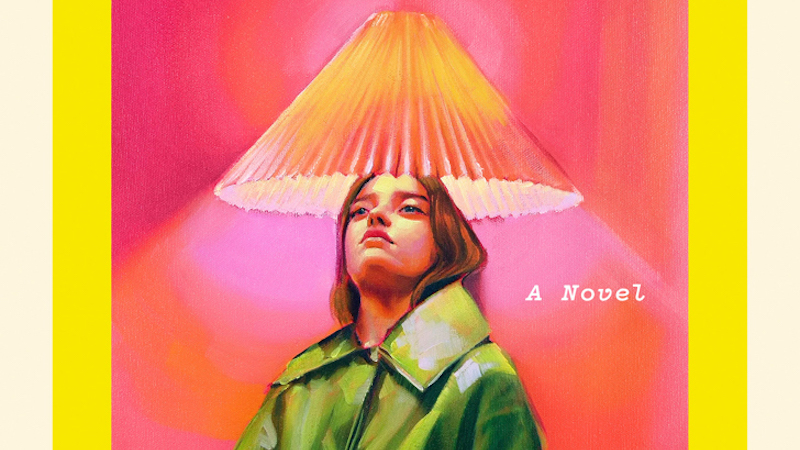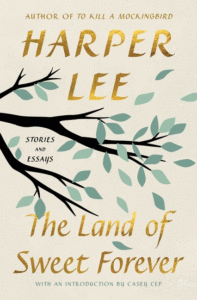
Our quintet of quality reviews this week includes Mark O’Connell on Claire-Louise Bennett’s Big Kiss, Bye-Bye, Elvia Wilk on Chris Kraus’ The Four Spent the Day Together, Darryl Pinckney on Nicholas Boggs’ Baldwin: A Love Story, Sandra Newman on Harper Lee’s The Land of Sweet Forever, and Terry McDonell on Thomas McGuane’s A Wooded Shore.
“…there is much in the text that is not made explicit, with the vivid exception of the narrator’s consciousness, in whose eccentric depths we spend the novel immersed. This is part of the book’s perverse brilliance, its sense of good old-fashioned modernist fun.
The extreme subjectivity of the first-person narrative is such that we are given few points of orientation. It’s well over halfway into the novel before we learn that Xavier is a retired private banker who has lost most of his once-considerable wealth, though we are left to wonder how. The effect of this is a kind of intimate disorientation, like looking so closely at a familiar face that you lose the sense of what you’re seeing.
…
All of this might make Big Kiss, Bye-Bye sound somewhat inert, but it is no more inert than consciousness itself, with its odd and ceaseless leaps and circularities. Bennett’s prose has something of the energy of Samuel Beckett’s trilogy.
Like Beckett’s lonely and dyspeptic codgers, Bennett’s narrator has about her a brittle dreaminess; she obsessively circles around the past in a manner both drifting and oddly determined. And if, when Wide Sargasso Sea comes up in the email exchange between the narrator and her old English teacher, the reader feels nudged to think of Jean Rhys, it’s a comparison that is neither unreasonable nor unearned.
…
“The novel contains many such moments of almost febrile power, rendered in prose both gorgeous and a little unnerving. To call Big Kiss, Bye-Bye entertaining would be to do an injustice to its discomfiting depth, but reading it is a strange and wonderfully invigorating experience.”
–Mark O’Connell on Claire-Louise Bennett’s Big Kiss, Bye-Bye (The New York Times Book Review)
“Most people remember the sex in I Love Dick; I remember the class. Chris Kraus’s legendary 1997 autofiction chronicles her love letters to a man she was obsessed with—a game of desire whose voltage came from real asymmetries of class, capital, and access.
From that view, Kraus’s new book, The Four Spent the Day Together, is another genius twist of the knife rather than a departure from her past works. It’s billed (brilliantly and misleadingly) as a true-crime novel, but by the time you get to the shocking crime with which it culminates, countless others of varying scales have piled up. Most overt is the sweeping nationwide crime of rural impoverishment; then there are the endless tiny, daily injustices that result. If genre-faithful true crime seeks sense in motive, Kraus is seeking those senseless systems that both produce violence and strip it of meaning.
…
“In the opening scene of the book, four-year-old Catt discovers wordplay when her father makes a small joke—’an ice toy’ becomes ‘a nice toy’—and ‘she smiled, the elliptical meanings of words rolling around in their mouths like hard candy.’ Catt may not be set up for money, but she’ll have a life of the mind. The kids of Balsam are not rolling the candy of language in their mouths. Kraus ends with an appendix of messages the murderers exchanged leading up to the crime…These texts are not rich text. They’re poor text. They don’t lend themselves to the illuminating, associative analysis Kraus is so gifted at. She has to let them speak—or not speak—for themselves. In I Love Dick, Kraus asked: ‘Is poverty the absence of association?’ She meant association in terms of social relations, but also in terms of language. The drugged murderers are disassociated in every sense. What a fucking tragedy. What a crime.”
–Elvia Wilk on Chris Kraus’ The Four Spent the Day Together (4Columns)
“Born in 1924, Baldwin discomforted the old believers, the black generation that had perfected the mask, much evolved since it was called upon to grin and lie. He dispensed with the mask. It constricted how swiftly he wanted his thoughts to move across the page. Language was a solution to a formal problem, the articulation of consciousness. His voice never aged, the cat on the café terrace staring down the moon when all the squares have gone to bed. For all his keenness of observation and sympathy for the people whose lives he knew or could imagine so well, his was not the voice of a generation. He belonged entirely to himself.
…
“He was beyond control, was, finally, his own jurisdiction, but it took some getting there. Seemingly every step in his life is reconsidered in Nicholas Boggs’s moving biography, Baldwin: A Love Story. Boggs has immersed himself in Baldwin’s novels, stories, plays, poems, and essays, published and unpublished; he has absorbed his available letters and journals, the correspondence from friends and editors, as well as the exhausting amount of writing about Baldwin, the articles, the reviews of his work, the critical studies, interviews in print and on camera, and conducted his own significant interviews with those informants who were still around when he was engaged in his research. Moreover, previous biographies of Baldwin, perhaps because they were written by people who knew him, David Leeming the most intimately, become his collaborators. They hand off the baton to Boggs and he goes the distance, because people now want to know everything about James Baldwin. He has come to that.
…
“Though Boggs writes of how the autobiographical expands to a wider focus in Baldwin’s novels, he nevertheless devotes considerable attention to the connections he can make between Baldwin’s life and his work, the ‘animating relationship between autobiography and fiction,’ the people and events he was thinking of, what he was setting off from.
…
“Most importantly, Boggs is out to counter the story of Baldwin’s writing life as one of decline in his later years. He wants him to end not in disappointment or irrelevance but with the Legion of Honor. He sees Baldwin’s novels as achievements comparable to his essays. Therefore he is always on the side of Baldwin’s intentions. That not everything by a great writer need be great is beside the point here, even if it’s something to keep in mind when talking about Baldwin.
–Darryl Pinckney on Nicholas Boggs’ Baldwin: A Love Story (New York Review of Books)

“When a new book is published by a writer dead for a decade, there is always some suspicion that the bottom of the barrel is being scraped. When the writer is Harper Lee, there is also the unpleasant aftertaste of the release of her second novel, 2015’s Go Set a Watchman, which was promoted as a sequel to To Kill a Mockingbird, when in fact it was a formless early draft. The publication was also surrounded by controversy over whether the aged Lee, by then seriously disabled, had really consented to its publication.
This new book, The Land of Sweet Forever, is a much more conventional enterprise: a collection of Lee’s unpublished short stories and previously uncollected essays. No deception is being practised here, and if people want to read the lesser scribblings of a favourite author, it is surely a victimless crime. However, like most such books, it has little to offer to those who aren’t diehard fans.
The short stories, written in Lee’s youth, are all badly underdeveloped. Most fail to work even as vignettes. One centres on trying to find a place to unload a truck in Manhattan; another on a temporary change to the way the doxology is sung in a Methodist church. A slender piece about the quirks of New York movie audiences is categorised as a story, but feels more like a newspaper sketch. The young Lee seems to have little sense of what a story is.
…
“If we regard this book as literature, it is an unqualified failure. But it’s more properly seen—and will surely be read—for the light it sheds on Lee’s life. As such, it’s obliquely fascinating, largely because it radiates repression. Often there’s a sense that we’re seeing the side of Harper Lee that wasn’t exceptional, but representative of a generation of women who were mostly muzzled. Again and again, the narration is choked off just when things begin to get challenging. The gender nonconformity of the protagonists—all thinly disguised versions of Lee—is often obvious but never explicitly mentioned. The conventionally cheery tone is almost a hostile presence, drowning out and censoring Lee’s real thoughts. Beneath the surface, we often feel the stubborn surging of the excluded. Lee writes in ‘The Cat’s Meow’: ‘I suppose a lot of people like me have mastered the first lesson of living at home these days: if you don’t agree with what you hear, place your tongue between your teeth and bite hard.’ We feel those painfully gritted teeth on every page of this book. In a time of rising censorship, it’s salutary to be reminded that an author as important as Harper Lee came so close to being entirely silenced.”
–Sandra Newman on Harper Lee’s The Land of Sweet Forever (The Guardian)
“The cover of A Wooded Shore is a photograph of a white cabin cruiser powering across smooth water with a single figure standing at the stern. It’s a beautiful day, but something is wrong. The bow is cut off, and the color is washed out, faded, with something sad about it, like an old family Polaroid you recognize but can’t quite place. Then it hits you. In every one of these Thomas McGuane stories, something is going to be very wrong and yet probably hilarious—existential slapstick in ventriloquial voices with such precise language and restraint that his sentences will literally shine up off the page.
…
“Like his 2018 comprehensive story collection, Cloudbursts: Collected and New Stories, A Wooded Shore is about Montana the way Dubliners is about Ireland—that is, about nothing less than the human condition and, especially in McGuane’s hands, the strangeness in the ways lives turn out. ‘Not Here You Don’t’ is relentlessly funny even as it is about loss, depression, and rattlesnakes. In ‘Thataway,’ he zigzags through offbeat plots with surgical language, tracing the branching storylines of an elderly woman’s death and the fallout on her family, especially her sister who has never left their impoverished town, and her brother, a marginal cowboy actor turned furniture-store tycoon who is forced to return to his hometown by his investigative filmmaker daughter.
…
“Beginning in the 1970s, I edited dozens of McGuane pieces at a number of magazines, mostly just hooking paragraphs and admiring his tight control of language, humor, and what one critic called his mastery of ‘macho angst,’ whatever that was. He enjoyed ‘long reaches’ like the one between being nominated for a National Book Award (Ninety-two in the Shade) and winning the team roping (‘I like to get a leetle loaded and rope horned cattle’) at the small local rodeo in Gardiner the same year (1974). This time, opening the digital galley, like every time I opened one of his pieces, or stories, or emails even, there was the excitement that I was in for something special, except that now his long reach is anchored by this further proof that there is no better writer than Thomas McGuane.”
–Terry McDonell on Thomas McGuane’s A Wooded Shore (Alta)

